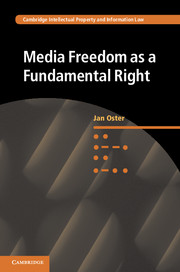Book contents
- Frontmatter
- Contents
- Preface and acknowledgements
- Table of cases
- Treaties, Conventions, Declarations and Statutes
- Reports and other documentary sources
- Introduction: aim, scope and method
- Part I The theoretical foundations of media freedom
- 1 The rationales for freedom of expression
- 2 Theory of media freedom
- Part II General rules on media freedom
- Part III Specific limitations to media freedom
- Conclusion: tenets of a Media Freedom Principle
- Bibliography
- Index
- Cambridge Intellectual Property and Information Law
2 - Theory of media freedom
from Part I - The theoretical foundations of media freedom
Published online by Cambridge University Press: 05 June 2015
- Frontmatter
- Contents
- Preface and acknowledgements
- Table of cases
- Treaties, Conventions, Declarations and Statutes
- Reports and other documentary sources
- Introduction: aim, scope and method
- Part I The theoretical foundations of media freedom
- 1 The rationales for freedom of expression
- 2 Theory of media freedom
- Part II General rules on media freedom
- Part III Specific limitations to media freedom
- Conclusion: tenets of a Media Freedom Principle
- Bibliography
- Index
- Cambridge Intellectual Property and Information Law
Summary
While the debate on the theoretical explanation of freedom of expression has been led for several decades, a theory of media freedom has, it seems, not been subject to a distinct scrutiny so far. First, a theory of media freedom has to rebut the objections against media freedom as a distinct fundamental right (see 2.1). Second, it is argued that the rationale for media freedom is the media's significance for public discourse (see 2.2.). Third, a theory of media freedom has to clarify the relationship between freedom of the media and freedom of expression (see 2.3).
General objections
The inference of a privileged protection of the media from freedom of expression is not uncontroversial. Even more, many legal scholars out- rightly reject the notion that the media should enjoy any privileges or be subject to any special duties. This point of view is particularly widespread – and equally controversial – in US scholarship. Different terms have been coined for this approach: the ‘equivalence model’, since the protection of the media should be equivalent to that of other individuals invoking freedom of expression, the ‘neutrality doctrine’, because the absence of special media rights follows from the state's obligation to be neutral in granting such rights, or the ‘press-as-technology model’, as freedom of the press should be conceptualised as the mere right of every person to use communications technology, and not as a right belonging exclusively to action can be found in the US Supreme Court's approach to the First Amendment, where the words ‘or of the press’ are used. Although the Supreme Court has acknowledged the role of the press ‘as a powerful antidote to any abuses of power by governmental officials’, it has ‘consistently rejected the proposition that the institutional press has any constitutional privilege beyond that of other speakers’.
- Type
- Chapter
- Information
- Media Freedom as a Fundamental Right , pp. 24 - 54Publisher: Cambridge University PressPrint publication year: 2015



